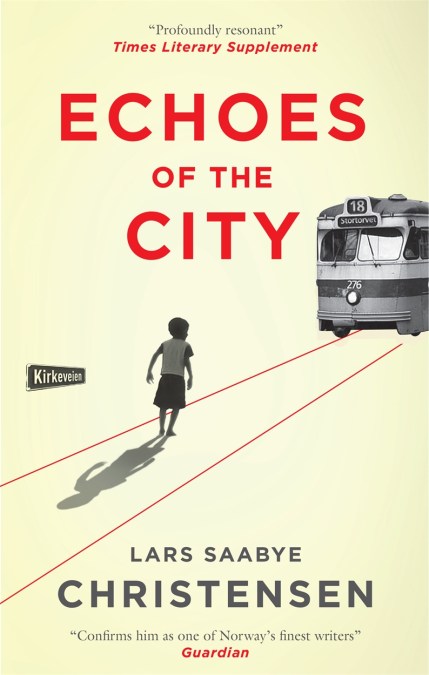We’ve all stood on a street corner and let the city’s lights and sounds pass by. What do we hear when we listen to the sounds of the city? What traces do they leave in us? The city and the streets are the same as before, but the people who emerge in Echoes of a City have never been seen before.
At the centre are Ewald and Maj Kristoffersen, but their fates are closely interwoven with the streets they live on. Down the road a couple has a butcher’s shop. They have a son, Jostein, who goes deaf after a traffic accident. Jesper, Ewald and Maj’s son, promises to be his ears in the world. The butcher couple and the widow Mrs Vik have a telephone, but not the Kristoffersen family. Jesper takes piano lessons, Mrs Vik meets the widower Olaf Hall who runs the second-hand bookshop at the cemetery. His stepson, Bjørn Stranger, is the one who saves Jostein’s life when he gets run over.
There are few – if any – who can conjure up a time and place in a way that makes it alive for us here and now like Lars Saabye Christensen.
At the centre are Ewald and Maj Kristoffersen, but their fates are closely interwoven with the streets they live on. Down the road a couple has a butcher’s shop. They have a son, Jostein, who goes deaf after a traffic accident. Jesper, Ewald and Maj’s son, promises to be his ears in the world. The butcher couple and the widow Mrs Vik have a telephone, but not the Kristoffersen family. Jesper takes piano lessons, Mrs Vik meets the widower Olaf Hall who runs the second-hand bookshop at the cemetery. His stepson, Bjørn Stranger, is the one who saves Jostein’s life when he gets run over.
There are few – if any – who can conjure up a time and place in a way that makes it alive for us here and now like Lars Saabye Christensen.
Newsletter Signup
By clicking ‘Sign Up,’ I acknowledge that I have read and agree to Hachette Book Group’s Privacy Policy and Terms of Use
Reviews
A portrait formulated with the poetic melancholy so typical of Saabye Christensen at his best.
Lars Saabye Christensen at the height of his powers.
The kind of novel that does not shout loudly, but is borne along by fine characterisation and wisdom disguised as sparkling gold grains, consolidating Lars Saabye Christensen's position as Oslo's premier home-town poet
"Memory is sorrow. History is reconciliation." These are the last words in the author's own voice that we read. This profoundly resonant novel - which ends in 1951, with more to come - invites us to ponder these ideas afresh.
With its tonal nuance and quietly amusing melancholy, Echoes of the City confirms him as one of Norway's finest writers"
A poignant meditation on memory, on finding one's place in the world, on family ties, loss and heartbreak . . . We are easily drawn into their lives and by the end it is hard to part with these characters who we have come to know so well.
